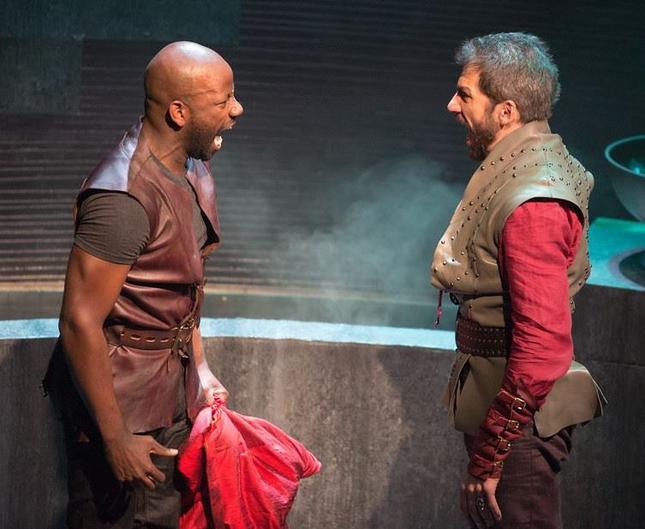A Dark, Brooding ‘Julius Caesar’ at the Folger Theater
By • November 17, 2014 0 1721

The director Robert Richmond is not shy about messing with the classics—he’s known for his bold stagings at the Folger Theater, including a ‘Richard III’ which practically disemboweled the stately, familiar Elizabethan theater and saw that grand old villain Richard and other characters mingle with audience members while the many murder victims were unceremoniously dumped in openings on the stage.
Richmond isn’t quite so extravagant with “Julius Caesar”, that most familiar of Shakespeare’s plays, but he does put a recognizable and pointed touch on the tale of the consequences of murdering the overweening, charismatic and ambitious Roman would-be-ruler-of-them-all.
You might not recognize the play or the place when you walk in—no senators in white robes, ceremonial or otherwise, no red-cloth generals, no sunlit forum. The prevailing colors are all dark—shades of gray, black and brown and so are the costumes. Ghosts abound—as soon as a characters die—and many of them do—they become hooded wanderers in the afterlife to haunt the living, looking a lot like the soothsayer.
We are not, by the looks of things, in Republican or ancient Rome, but rather in ancient-ancient Rome in the first act, in what looks like the landscapes of modern warfare in the second act, in the middle of yet another war to end all wars, where the dogs of war have indeed been loosed.
This has the effect of electrifying the play, make it something brand new, but at the same time, there’s a certain amount of confusion in this approach, especially the attempt to put a stamp of “war is hell” on the second act.
But enough: “I’m here to praise this ‘Caesar’”, not to bury it.
What Richmond’s approach does do is make this play fresh and by reputation alone, it needs it. This is the best “Caesar” I’ve seen in a long time, maybe ever, short of the Brando-Mason black and white movie version many, many moons ago.
This is a Shakespeare that practically sounds like a staged version of Bartlett’s Familiar Quotations, so familiar are so many of the lines and speeches in the play. And yet, perhaps because of the unsettling staging, the lines and speeches seem somehow fresh, accessible, almost contemporary in the speaking and the playing.
Just a stone’s throw from Capitol Hill, where many a scheming senator makes a living, this is also a very political play by its nature. It’s about politics and power, its uses and misuses, about action and inaction, about calculation and mis-calculation. Here we have a man—Julius Caesar who’s all but created the foundation of the expanding Roman empire through his military victories. Here’s a man with populist charisma who’s not very interested in sharing power. He’s a modern man of his times, in a Roman republic built on strands of Greek democracy and an unbending class systems.
In the shadows, Roman senators, seeing themselves as upholders of Republican tradition, plot against Caesar, because he’s ambitious, because he’s taken on aspects of a tyrant. Cassius, with his lean look and jealousies, knows they need Brutus, the Roman with the noblest lineage, to participate in the assassination of Caesar.
In this murky, dark atmosphere, there is a sense of foreboding all around—not just a soothsayer warning again of the Ides of March, but dark omens, and whispers in the dark. Cassius enlists Brutus by appealing to his honor, pride and ego, until, in the end, he delivers the final thrust of a dagger to his mentor and friend, who collapses with his famous last words: “Et Tu, Brutus?”
Yes, him too.
Having slain the head of state, it’s all downhill for the conspirators, if not the play. Brutus, being an honorable man, makes the mistake of letting Anthony speak last in the funeral oration, and the war is pretty much lost by the conspirators right then and there.
I’m bothered by the mix-mash of WW1 (and WWII) helmets worn by the battling forces—it’s a civil war after all, but the second act also moves like a chariot race.
Directorial flourishes aside, it’s always the actors that make a bad, fair, good to better than good “Julius Caesar”. This one’s better than good. Michael Sharon gives Caesar an almost rock-star quality, a man who believes absolutely in his star power, and will eventually veer towards absolutism. And speaking of rock stars—there’s Maurice Jones as Mark Antony, Caesar’s ally and friend, who kills it in the funeral oration, essentially lighting up Rome in a civil war. And Louis Butelli practically channels John Malkovitch as Cassius in a lights out performance that makes the character more than just a jealous conspirator—his wooing of Brutus is based in friendship and love.
Anthony Cochrane, I think, has solved the riddle of Brutus—he’s the pivotal character in the play, yet somehow never takes command of the play. That’s not the actor’s fault—this Brutus is a cerebral man, a careful man who errs always on the side of humility lest he appear arrogant, like Caesar, which of course he is. He holds himself in—even when he gets the news that his wife has killed herself by eating fire, he barely raises an eyebrow until he shudders alone in his tent.
It’s a revealing way to deal with Brutus—“the noblest Roman of them all” has a noble lineage but not enough of a noble bearing to carry the day. He’s been told that he’s an honorable man by too many people, including with sarcastic and deadly effect by Antony.

